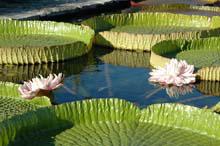| There are several other tales to tell. The first is a documentary of the growth rate of Victoria cruziana when first installed in pond bottoms. We just happened to snap pictures at the right time to show this. See The Astounding Growth Rate of V. cruziana. | ||
|
From 2007 Speaking of Stalling, we grew out two cruzianas stalled for more than a year and two started last spring. At maturity we could see no difference in size or general health except for the BIG ONE, a spring plant that achieved the greatest size we have ever had for cruziana, actually for any Victoria, at 68" (173cm). It crowded out a small amazonica in Reflection and threatened to overwhelm 'Adventure', itself a big plant. Only removing perfectly healthy pads from the cruziana kept it from covering 'Adventure's' crown. Learning more about stalled plants can be very helpful for several reasons. These plants can provide a quicker start in spring than waiting for new seedlings to grow to installation size (now that we know from our own and others' observations that they attain normal size). They are also a hedge against poor germination or seedling disaster in the new year as well as offering options for people with small ponds. Just how much abuse can these minis take? See 2008 Still Stalled |
 By the end of August the big cruziana had taken over the entire end of Reflection and was pushing pads over the edge.. |
|
| A fifth cruziana plant is a survival story beyond our experience. Several cruzianas survived the winter of 2007-2008 but struggled. Late in April we dug out of Reflection a barely alive plant that had been a primary parent in 2007. We chopped the old rhizome off, potted it down to 6" (15cm) and put it in slightly heated Sun. It got turned partly over. It got down to one half of a 4" (10cm) pad. It got righted and decided not to just live but to thrive. Installed in Dune for the 2008 season, it actually got bigger than it did in 2007. It is one of our illustrations in The Astounding Growth Rate of V. cruziana. | ||
| One of the stalled cruzianas that we grew out was an original from the 2000 collection in Paraguay. It is amazing to note that those seeds still sprout from time to time. The seedlings are usually weak and don't survive, but this was an exception. It tells us never to give up on old seeds, no matter how nasty they appear (and smell). | ||
| That cruziana did something we have never seen before -- on three occasions it had two same night flowers with no skip days. We have often seen a first and second night flowers on the same plant but usually there was then an out-of-rhythm gap before the next flower. During the main season, 'Adventure' and cruzianas have a new flower every other night, amazonicas usually every fourth night. | ||
 |
A report on how fall plants would do from 2007 Why Is That? is fairly amazing. The V. 'Adventure' in Treasures bloomed all winter and spring and, in summer, was bigger than ever. It bloomed every third night like clockwork. Sand was added around its crown once but nothing else was done to help its survival except fertilization. It made 69 flowers over nearly two years and finally didn't survive being pushed over in February 2009. | |
| We grew 13 plants to adulthood, though three amazonicas didn't bloom before they died. We had only 290 flowers, not including the miniatures, down significantly from 2007, largely due to the premature loss of the amazonicas. Our seed yield per pod was our highest ever, probably the result of the huge flowers of the big cruziana. | ||



